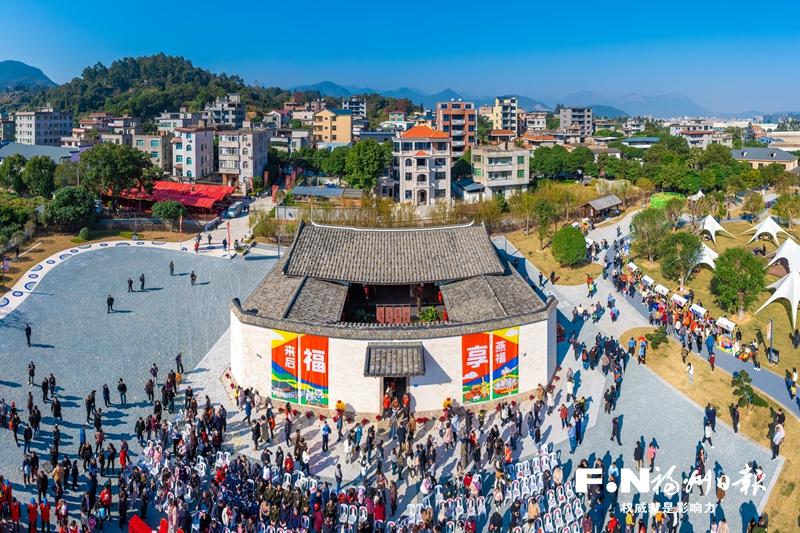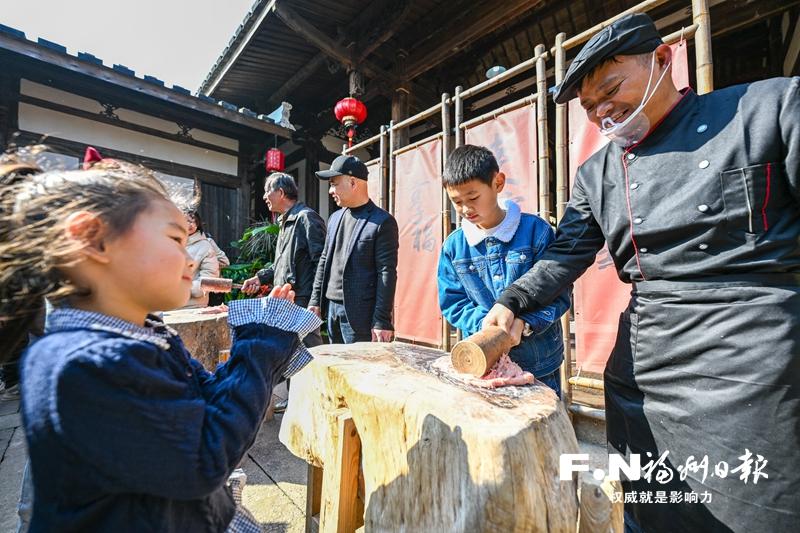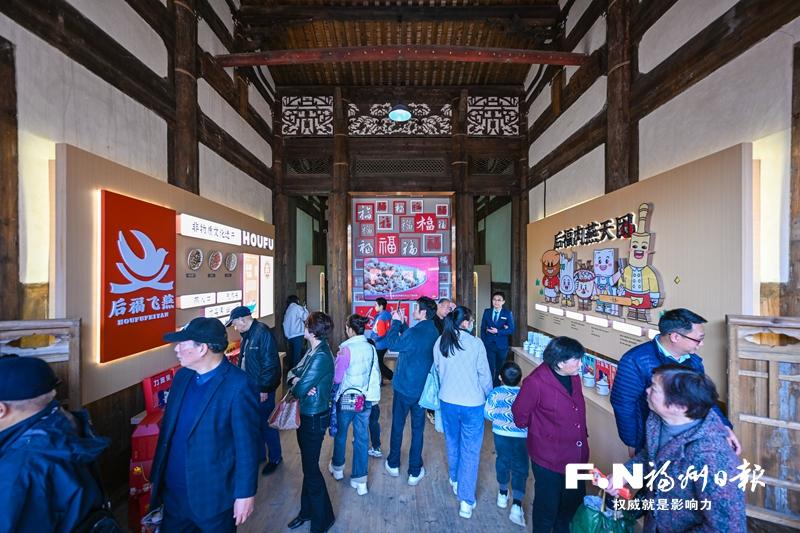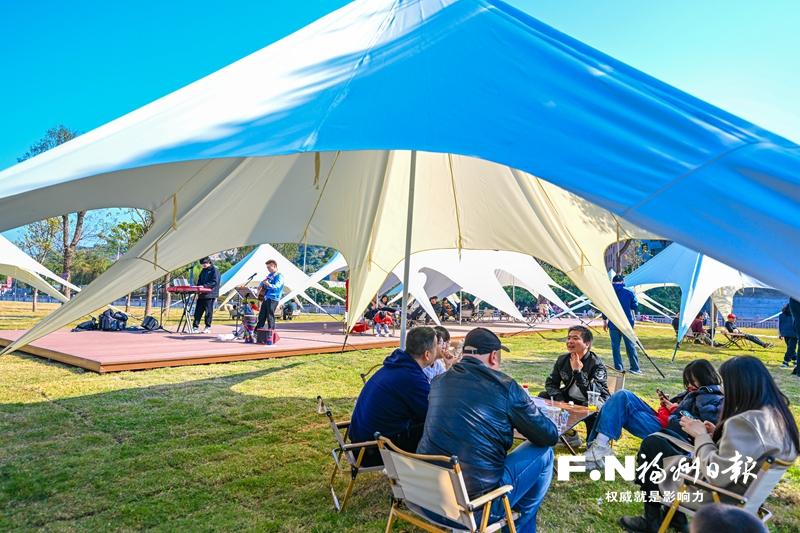Fuzhou Pork Wonton Museum
The Fuzhou Pork Wonton Museum was established in the Backyard of Southeast Auto City.
A Special Gift from Houfu Village: The Pork Wonton Museum in the Ancient House
As the wooden mallet struck the pork with a rhythmic beat, it was gradually transformed into minced meat, drawing continuous admiration from the onlookers. On the morning of the 6th, the Fuzhou Pork Wonton Museum officially opened in an ancient house in Houfu Village, Qingkou Town, Minhou. Lin Zhongxia, an inheritor of the pork wonton intangible cultural heritage from Houfu Village, demonstrated the traditional “thousands of strikes” technique, offering a captivating glimpse into the rich culture of Fuzhou’s pork wontons.

The Pork Wonton Museum is located in a preserved and relocated ancient house. (Photo by Reporter Lin Shuangwei)
“The Meixi area in Houfu, known as the backyard of Southeast Auto City, is famous for its pork wontons.” The long Meixi River winds gently, with the beautiful Houfu Village nestled along its banks. This small village, located in Southeast Auto City, perfectly blends the vibrant modern industry with its rich historical heritage.
As visitors strolled along the tidy, well-kept lanes of Houfu Village, they were captivated by charming cartoon murals illustrating the rich history and intricate craftsmanship of pork wonton making. The village’s pork wonton tradition dates back to the 1950s and 1960s, when the establishment of the Fuzhou Pork Wonton Production Cooperative, along with a thriving livestock industry in the “Qili” area, spurred the emergence of local wrapper-making workshops. These workshops quickly flourished, becoming a pillar of the village’s economy. In 2018, villager Lin Zhongxia, together with several fellow villagers, established Fuzhou Furongyan Foods Co., Ltd., expanding the reach of Houfu pork wontons to markets in Guangdong, Zhejiang, Shanghai, Liaoning, and beyond. Now, the company’s annual output value exceeds 10 million yuan.

A child was experiencing the technique of making pork wontons. (Photo by Reporter Lin Shuangwei)
“We will continue to support the growth of leading enterprises, while also helping the village workshops achieve collective development,” said Chen Zhengxun, the rural revitalization technology commissioner from the Talent Office of the Fuzhou Municipal Party Committee.
With the guidance of the Houfu Pork Wonton Farmers’ Cooperative, the villagers of Houfu have developed an integrated “cooperative + company + workshop” model for producing and selling traditional wonton wrappers. They have also introduced innovative flavors such as “shrimp wonton,” “shiitake mushroom wonton,” and “water chestnut wonton,” while building a distinct brand around Fuzhou pork wontons to drive the large-scale and standardized growth of the local pork wonton industry.
Today, the pork wonton artisans in Houfu Village are blending innovation with tradition, continuously expanding and strengthening the pork wonton industry. The village has seen not only the founding of the “Furongyan” company by Lin Zhongxia, the third-generation inheritor of Houfu Pork Wontons, but also the creation of the “Houfu Feiyan” brand, developed through the collaborative efforts of the Houfu Pork Wonton Farmers’ Cooperative.
With the industry driving force in place, how can we foster the development of distinctive pork wontons and build a unique cultural IP for pork wontons?
Houfu Village worked with Fuzhou Daily to plan and launch the project “Fuzhou Pork Wonton Museum.” As the first museum of its kind in Fujian Province, it features a “Houfu Pork Wonton Squad” IP along with a dedicated illustrated storybook of “Houfu Pork Wontons.” Together, they vividly showcase the traditional techniques of Fuzhou’s pork wonton making and share the story of how Houfu Village has turned this signature specialty into a driving force for rural revitalization.

Visitors visited the Fuzhou Pork Wonton Museum. (Photo by Reporter Lin Shuangwei)
The Pork Wonton Museum was originally an ancient house that was relocated and preserved by the Meixi River in Houfu Village. The museum vividly tells the story of Houfu pork wontons, tracing their evolution through text and images. Visitors can also try their hand at the traditional wonton wrapper-making process at the museum and sample Fuzhou pork wontons, a dish that symbolizes good fortune.
“We have designed the ‘Houfu Ancient House Trail,’ featuring cartoon images of Houfu Pork Wonton painted on the village walls, and have also set up several popular photo spots,” said the project leader. By blending traditional industries with trendy elements, they aim to breathe new life into the development of rural specialty industries and cultural tourism.
The 2024 Qingkou Town “My Contributions to My Hometown” Rural Revitalization Talent New Year Gathering, along with the Southeast Auto City Backyard Cultural and Tourism Operations Promotion Conference, was held during the opening of the museum. The Houfu Ancient House Trail, Houfu Grassland Campsite, and Meixi River Eco-Safety Water System Management Project, all located near the Pork Wonton Museum, were unveiled.

Visitors enjoyed their weekend at the Houfu Village Campsite. (Photo by Reporter Lin Shuangwei)
“We have both well-known cultural landmarks and picturesque natural scenery, complemented by excellent public service facilities such as Central Park, Qianjia Mountain Park, and the Qingkou Cultural and Sports Center,” said Lin Jie, Mayor of Qingkou Town. Qingkou Town plans to develop a premium tourism route in the Meixi area in Houfu, combining “industrial tourism” with “rural tourism.” “Located adjacent to the Southeast Auto City, this area is dubbed the ‘Backyard of Southeast Auto City.’ With the Pork Wonton Museum as a key attraction, we have also developed a campsite along the Meixi River, right next to the museum. We aim to create a comprehensive leisure destination that blends recreation, entertainment, and dining, thus offering a ‘great destination near the factory’ for Southeast Auto City employees and a ‘photo-worthy destination right at the doorstep’ for surrounding residents.”
“The Pork Wonton Museum has opened, and the campsite is ready. We’ve now ‘built the nest’ and hope to attract the ‘phoenix’ to operate it professionally,” said Liu Xiang’an, Party Secretary of Houfu Village. With everything in place, Houfu Village is ready to move forward. We warmly invite professional operation teams or companies to join us in creating a pathway for rural revitalization through Fuzhou pork wontons. (Fuzhou Daily Reporter: Tan Xiangzhu)